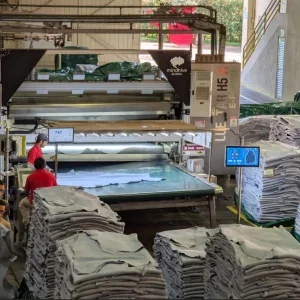Stahl, a world leader in specialty chemistry for coatings, processing, and treatments for everyday materials, has opened a Centre of Excellence in Kanpur, India.
The centre focuses on sustainable leather technologies and is part of a five-year public-private partnership between Stahl, Solidaridad, PUM Netherlands senior experts and local stakeholders to reduce pollution, increase water efficiency and improve working conditions in the Kanpur-Unnao Leather Cluster, in the state of Uttar Pradesh.
The mission of the Centre of Excellence is to support the introduction of environmentally friendly technologies and processing methods and to train staff in best practices for leather manufacturing. The Ganges, which flows nearby, is one of the world’s most important rivers, providing water to about 40% of India's population.
“Sustainability is key for the future of the leather sector and the many thousands of people working in it,” says Gert van der Bijl, international programme manager livestock & leather at Solidaridad. “The opening of this Centre of Excellence is really an important milestone in the partnership between Solidaridad and Stahl. It creates the possibility to demonstrate new technologies, and train tannery staff to apply more sustainable practices. And thus work together on a cleaner Ganges.”
Michael Costello, director of sustainability of Stahl: “In this state-of-the-art Centre or Excellence for sustainable leather technologies, our experts will work side-by-side with tanners and other local partners to share knowledge and showcase the latest sustainability-driven solutions and technologies, with a particular focus on reducing water pollution in the nearby tanning clusters. The Centre of Excellence is located in Kanpur in order to ensure the successful implementation of the public-private partnership goals, and to ensure that the initiatives remain in place after the project period expires.”
Promoting safe use of chemicals
Around 200 attendees joined the opening of the Centre of Excellence for sustainable leather technologies in Kanpur, during which Stahl shared its views on – and efforts towards securing – a more responsible future.
“We actively promote the safe use of chemicals around the world,” says Tuncay Deriner, Stahl's managing director in South Asia. “Since the start in 2017, over 100 tanneries in the Kanpur-Unnao cluster have taken part in occupational health and safety training courses and demonstrations on topics like TDS, BoD, CoD, handling chemicals and the safe use of hydrogen sulfide (H2S). With the Centre of Excellence in Kanpur we can contribute even more to promoting safe use of chemicals in leather-making, especially in the Kanpur-Unnao region.”
Focus on pickle-free tanning and clean waterproofing
The day before the event, during the pre-launch, customers and partners were invited to participate in a workshop about innovative technologies for responsible leather. Central to the workshop were the recently introduced pickle-free tanning and waterproofing technologies. Prasanna Maduri, Stahl Campus® manager India, explains the added value of sustainable technologies like the pickle-free tanning process.
“The key benefits of the pickle-free technology are that it reduces the effluent load and eliminates the use of salt, acid and the basification process, depending on the type of substrate. This way we can reduce water consumption by about 40% and work towards a more efficient tanning process. The pickle-free process will lead to a reduction in effluent load on the Ganges river basin.
Pollution prevention and efficient water use in the Kanpur-Unnao Leather Cluster
The public-private partnership between Stahl, Solidaridad and PUM Netherlands senior experts, launched in November 2017, focuses on reducing water pollution, thereby contributing to the wellbeing of thousands of families in the local community.
Read more about the public-private partnership on stahl.com/partnerships/cleaning-ganges.






